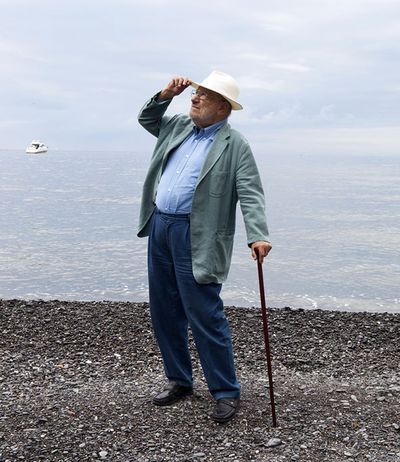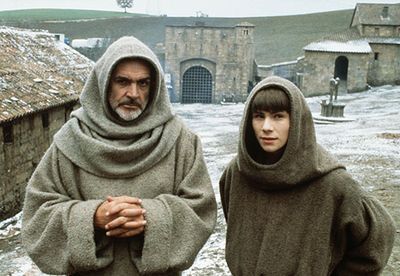Drinking whisky with Umberto Eco

Umberto Eco, 2015; copyright Leonardo Cendamo/Writer Pictures
By IAN THOMSON
Umberto Eco, Italy���s best-known literary export, was in a bad way when I met him in 1986 at Bologna University, where he was Professor of Semiotics (that abstruse branch of literary theory). ���I���ve become a dissociated and schizophrenic personality���, he told me, crumpling up a cigarette packet. ���The movie of The Name of the Rose has upset my psychic balance!��� Shuffling grumpily round his office, he lifted up and slammed down books. Eco���s 1980 medieval whodunit had just been made into a film by the French director Jean-Jacques Annaud, starring Sean Connery as the monk-detective William of Baskerville. An artful reworking of Conan Doyle (with Sherlock Holmes transplanted to fourteenth-century Italy), the novel had sold more than 10 million copies worldwide. However, Eco refused to speak to journalists about the film.
Each night when he returned to his flat in Milan, he could ���hardly open the door��� for the accumulation of interview requests. In private, Eco judged Annaud���s movie a travesty, and found the monks (apart from the one played by Connery) ���simply far too grotesque-looking���. To top it all, Italian Vogue had claimed that Eco was writing a novel based on the life of Mozart. ���Not true! I feel blackmailed by journalists, by myself, by you, by my publisher. I don���t feel free any more. When I wrote The Name of the Rose it was half for fun ��� a free act. Now I ask myself: ���Am I writing a new book because I want to, or because it���s expected of me?������ In a voice made husky by sixty cigarettes a day, Eco grudgingly conceded that Annaud���s Piranesi-like sets were ���quite good���. In his trademark tweed deerstalker, Eco cut an odd figure.

The Name of The Rose: Sean Connery and Christian Slater, 1986
His death last week at the age of eighty-four provoked a deluge of obituaries. A polymath of towering cleverness who was fond of scholastic hair-splitting and arcane medieval erudition, Eco was not uniformly admired. His novels had the look and feel of encyclopedias, and combined cultural influences ranging from T. S. Eliot to the Charlie Brown comic strips. The success of The Name of the Rose weighed heavily on him. Joggers in Central Park listened to the novel on their Walkmans. Eco���s gifted English translator, William Weaver, built an extension on his Tuscan home with the proceeds: the Eco chamber, he called it. Eco���s second novel, Foucault���s Pendulum, published a couple of years after we met, in 1988, was a thriller set amid shadowy cabals and conventicles such as the Hermetic Order of the Golden Dawn. Eco saw modern-day political parallels with these and other sects; Italy���s crypto-fascist P2 masonic lodge and the far-left fringe of the Red Brigades indulged a similar secrecy and fanaticism. Not surprisingly, Eco liked to use the Italian term dietrologia, which translates, not very happily, into ���behindology��� and presumes that secret cliques and consortia are everywhere manipulating political scandals. In all his work, fiction and non-fiction, he displayed a quite Italian fascination for conspiracy and arcana.
���May I be permitted to offer you another whisky?���, he asked. I held out my glass and he accidentally stubbed out his cigarette in his own. ���Hell, I���m drunk!��� Bologna University had been a hotbed of Italian red activism in the 1960s and early 70s, and the philosophy faculty where we spoke was spray-gunned with political slogans and crude attempts at action painting. Eco was not that impressed. ���It was supposed to be a ���creativity equals liberty��� campaign, but the graffiti isn���t as witty as it used to be.��� Still Bologna is the undisputed gastro-heart of Italy, and Eco relished the city���s rich cuisine as well as its lewd medieval street names (via Fregatette, ���Rub-Tits Street���, was one of his favourites). Portly, with a great black beard, he gave lectures attended by semioticians of every stripe. Eco said he was definitely not ���intellectually slumming it��� by speaking of Donatello���s David in the same breath as, say, the US porn star and vice-presidential candidate Marilyn Chambers. When the entire world is a web of signs, he insisted, everything cries out for exegesis.
���Marginal manifestations of culture should not be ignored���, he went on, pouring us another shot of Talisker malt. ���In the nineteenth century, Telemann was considered a far greater composer than Bach; by the same token, in 200 years, Picasso may be thought inferior to the Coca Cola commercials.��� (And who knows, Eco added half-jokingly, one day we may consider The Name of the Rose inferior to the potboilers of Harold Robbins.) In his mandarin analysis of the mundane, Eco was influenced by the French counter-culture essayist Roland Barthes. While Barthes wrote about washing powder, Greta Garbo���s face, or the new model Citroen in a subtle, teasingly paradoxical prose, Eco���s essays (collected variously in Faith in Fakes, Travels in Hyperreality and How to Travel With a Salmon) showed a certain crude braggadocio and swagger. He was at his best when composing bookish parodies and spoof sequels to famous novels. In one of these, the narrator of Marcel Proust���s A la Recerche du temps perdu dies in Dublin after reading Joyce���s Ulysses and drinking an excess of Guinness.
Eco���s last novel, Numero Zero, published in 2015, was a razor-sharp thriller set in Milan in 1992, and deservedly a bestseller in Italy. Pape Sat��n Aleppe: Cronache di una societ�� liquida, a collection of essays that originally appeared in L'Espresso, will be published tomorrow.
A selection of articles written by Umberto Eco for the TLS from the 1960s onwards ��� "a blend of aphorism and didacticism", as J. C. describes them in the current issue ��� is available on the TLS website.
Peter Stothard's Blog
- Peter Stothard's profile
- 30 followers



